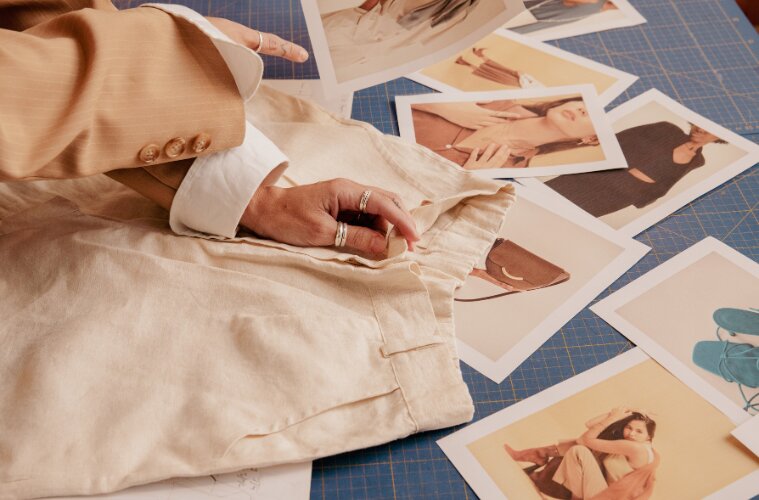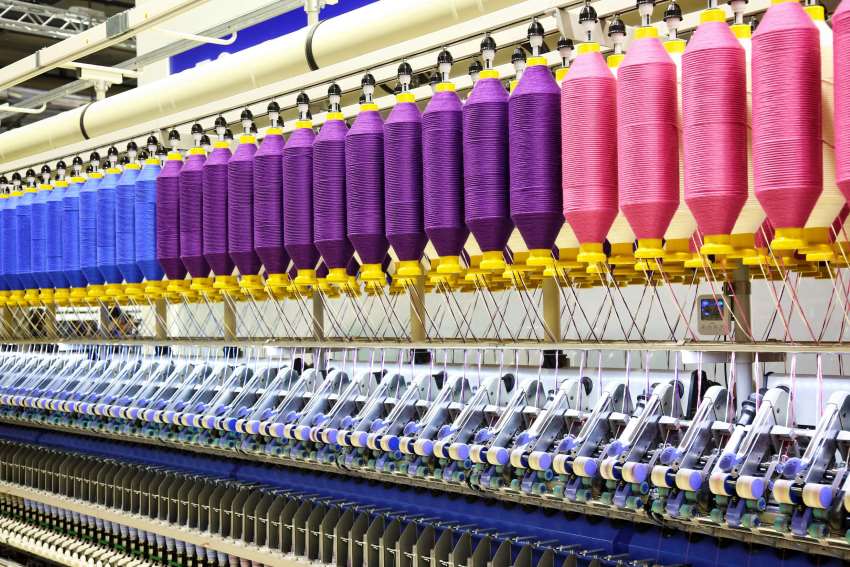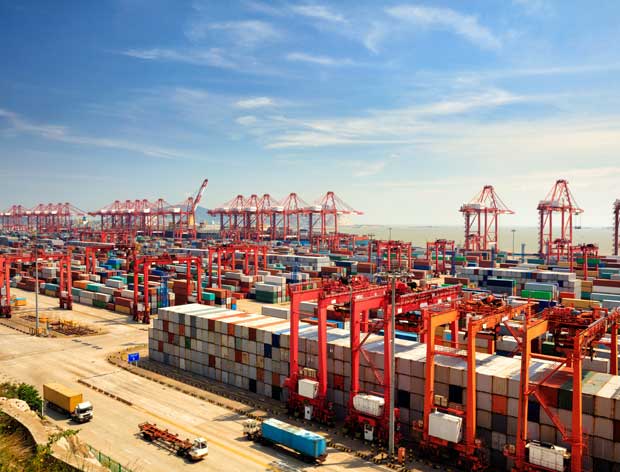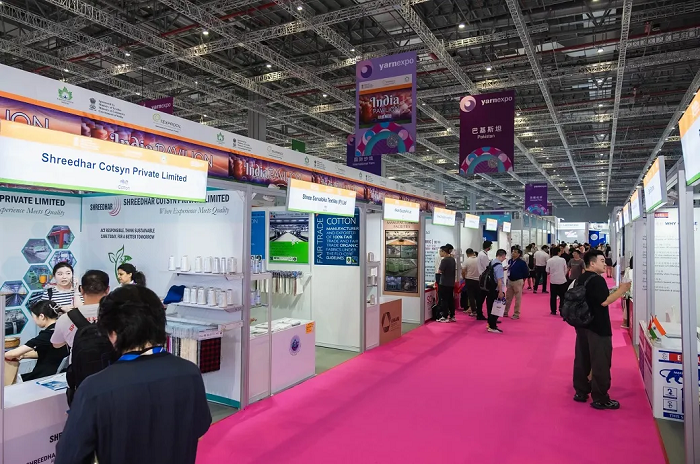FW
The knitwear industry in Tirupur has urged mills not to increase cotton price further, as exporters are already struggling to survive. The falling rupee has given no respite to the industry as the price of yarn, its key raw material, has zoomed. Cotton yarn price has risen by Rs 20 a kg this month to Rs 240 per kg for 40 count yarn. With strengthening cotton prices, industry fears another hike of Rs 5 per kg in July. The price hike has put the knitwear garment export sector in a difficult situation, hard to sustain in the competitive global environment.
Beleaguered knitwear export sector has been passing through a challenging business environment following the implementation of GST. This was evident from the continuous decline of knitwear exports month after month since October 2017, after three months transition period was over. The exports declined by as much as 21 per cent during the second half of 2017-18. The most worrying factor is that the negative growth trend in exports is continuing in the current financial year and the average decline of knitwear exports in the month of April and May was 34 per cent.
Print Make Wear, the new textile printing technology was launched recently at the Global Print Expo 2018. The technology, launched by FESPA, was viewed as an opportunity to update industry knowledge in the areas of increased efficiency and sustainability, workflow and technology and evaluate equipment and technology to inform future investment.
Around 467 delegates at the event registered specifically for Print Make Wear. They were joined by the 17 per cent of visitors to the FESPA event who came with a specific interest in garment decoration and/or manufacturing, and who visited the Print Make Wear area, as well as more than 2,000 visitors who took advantage of the expert-guided feature tours.
Technology investment was high on the agenda of visitors to Print Make Wear, with more than half planning to invest within six months, supported by average investment budgets of over Euros 180,000. The audience comprised 90 per cent senior managers, with 76 per cent of visitors having purchasing authority.
Albstadt-based circular knitting machine manufacturer Mayer & Cie. (MCT) has been named one of Germany’s most innovative SMEs for the second time. The company was awarded for its innovation management and success, the most well-known example of which is currently their spinitsystems spinning and knitting technology.
A compact machine with the dimensions of a conventional knitting machine, the technology combines two previously separate processes, spinning and knitting. This saves a great deal of time, space and energy. Operating for over 100 years, Mayer & Cie has sold over 75,000 machines worldwide since its founding. The company invests 5 to 6 per cent of its turnover each year into research and development. Around 7 percent of the employees are engaged in development and construction. Mayer & Cie. keeps a close ear to the market – and not just with the sales and marketing staff in the headquarters in Albstadt, but also with 80 representatives around the world.
Febratex, the Brazilian Textile Industry Fair, will be held from August 21-24 August, 2018 in the German Village Park in Blumenau (SC).The fair will be attended by 2,400 national and international companies who will showcase innovations in the entire global production chain. Karl Mayer will showcase its Warp Knitting Business Unit at the event. This will include the first high-speed tricot machines, type HKS 3-M, with a working width of 130 inches; and featuring the KAMCOS ® 2 computer platform.
The Warp Preparation Business Unit will also be exhibited on an infostand showcasing products that can be manufactured on a variety of machines and equipment for producing warp beams. Karl Mayer also plans to target weft knitting companies at the fair. In Blumenau, an HKS 3-M will be processing elastane to produce a stretch filet fabric for use in sportswear. This product and the performance of the machine are designed to offer producers of weft-knitted fabrics an attractive, alternative technology.
The knowledge segments at the upcoming Home Textiles Sourcing Expo will focus on the global home textiles landscape, colour trends for Autumn/Winter 2019-20 and a unique panel on translating fashion trends into home décor. The expo will be held alongside Texworld USA and Apparel Sourcing USA offering a wide variety of seminars and panels. As a marketplace for networking, education and sourcing, it is the only trade event in North America to centre entirely on home textiles and finished soft goods for all home applications.
Seminars at the expo include a session dedicated to sheets, towels, tariffs and trade: what it all means for the global home textiles market in 2018 and beyond. The expo panels feature two sessions. Translating Fashion Trend to Décor with Staying Power will be presented by Jana Platina Phipps. Many couture fashion trends have the chance of looking absurd in home design. However, many of the innovative fabrications, textiles, embellishments and color palettes seen on the runway serve as great indicators and inspiration for what will trickle down to decor in surprising ways. Embellishment expert and design blogger Jana Platina Phipps, known as Trim Queen, will invite participants on a fast-paced visual tour through what's "haute" and which trends can be integrated right into the home market.
A panel titled ‘The New Home Textiles Landscape - What’s Needed to Survive and Thrive Tomorrow’ will discuss burning issues of interest to importers, product developers, marketers, sources, and creatives. A panel of experts will present exclusive research about consumer shopping behaviors, trend forecasts that address changing consumer’s lifestyles, and insight from a retail disruptor about the new landscape.
Twine Solutions has announced Delta Galil Industries, a global manufacturer and marketer of branded and private label apparel, as its first beta customer for proprietary Digital Selective Thread Dyeing System and Solutions. The system will be used to support Delta's goals in developing new fabrics, products, finishing technologies and marketing concepts.
Delta Galil leads the industry in technological innovation in textile manufacturing, products and design hence, Twine's Digital Selective Treatment (DST) technology is the right match in to Delta's mission in evolving and innovating with high impact emphasis on the environment.
Delta Galil will join forces and collaborate with Twine which will enable Delta to produce the most updated digital solutions for textiles, making sure they continue to be the market leaders in their field. Delta Galil is dependent on leading apparel designers and retailers worldwide to help them introduce new products and innovative manufacturing solutions that answer consumer demands and help grow their market share, commented Gil Shimon, President of Global Upper Market at DGI.
Twine Solutions was founded in 2015 in Israel. Twine’s system continuously dyes a single raw or off-the-shelf thread to any requested length and in any colour, with a choice of millions of colours, shades, as well as colour gradients. Delta is a high quality apparel global leader that focuses continuously on quality, design and innovation. The companys are thrilled that they have embraced twine's cutting-edge technology, together they would revolutionise the thread, fabric and garment industries.
A meeting of the leaders of the Uztekstilprom Association with Chinese Ambassador to Uzbekistan Jiang Yak noted Chinese investments into Uzbekistan’s textile industry has been on the rise increase. Investments now exceed $ 200 million.
They discussed issues of development of cooperation between Uzbek and Chinese textile associations, large textile companies, expansion of investment activities of Chinese companies in Uzbekistan, increase in trade turnover between the countries, in particular, consideration of the issue of optimization of rates of customs duties on the import of Uzbek textiles to China were discussed. Particular emphasis was placed on the development of the Chinese government's technical assistance program aimed at training and upgrading skills of young specialists for the textile, clothing and knitting industries.
Also, the Chinese side invited representatives of the textile industry of Uzbekistan to participate in the upcoming International Exhibition “Expo China 2018” to be held in November. In its turn, the Association invited Chinese companies to take part in the International Exhibition of Textile and Fashion Industry “UzTextile Expo 2018” and the international conference “Uzbekistan Textile Conference,” which will be held in Tashkent from September 4-7, 2018.
"CHIC, China International Fashion Fair would present around 800 exhibitors in an exhibition space of approx 50,000 sq. mt. in two halls from September 27 to 29, 2018 at the National Exhibition & Convention Center, Shanghai. The current conditions for international fashion companies in the Chinese market offer significant improvements for international brands. Import tariffs will be lowered from 15.9 per cent to 7.1 per cent to promote import and upgrade the industry. This edition's motto is ‘New Makers’, with this, Asia's leading fashion fair is picking up on the latest changes in the Chinese fashion market and providing the essential tools for the Chinese market. The new, young design of the fair, launched in March this year at CHIC, is being expanded."
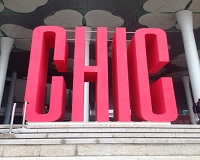 CHIC, China International Fashion Fair would present around 800 exhibitors in an exhibition space of approx 50,000 sq. mt. in two halls from September 27 to 29, 2018 at the National Exhibition & Convention Center, Shanghai. The current conditions for international fashion companies in the Chinese market offer significant improvements for international brands. Import tariffs will be lowered from 15.9 per cent to 7.1 per cent to promote import and upgrade the industry. This edition's motto is ‘New Makers’, with this, Asia's leading fashion fair is picking up on the latest changes in the Chinese fashion market and providing the essential tools for the Chinese market. The new, young design of the fair, launched in March this year at CHIC, is being expanded.
CHIC, China International Fashion Fair would present around 800 exhibitors in an exhibition space of approx 50,000 sq. mt. in two halls from September 27 to 29, 2018 at the National Exhibition & Convention Center, Shanghai. The current conditions for international fashion companies in the Chinese market offer significant improvements for international brands. Import tariffs will be lowered from 15.9 per cent to 7.1 per cent to promote import and upgrade the industry. This edition's motto is ‘New Makers’, with this, Asia's leading fashion fair is picking up on the latest changes in the Chinese fashion market and providing the essential tools for the Chinese market. The new, young design of the fair, launched in March this year at CHIC, is being expanded.
Individual sections present the latest trends in Chinese and international fashion market. CHIC connects and brokers partnerships and launches the new generation garment industry, which builds on high-tech strategies and interlinks industrial production with modern information and communication technologies, relying on intelligent, digitally networked systems in self-organised production.
Individual pavilions
Fashion Journey puts the focus on international exhibitors. In addition to the large Italian pavilion, the French pavilion ‘Paris Forever’ and the Korean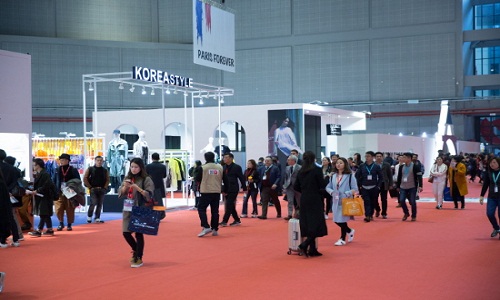 show-in-show ‘Preview in China’, individual participants from Poland, the UK, France, Italy, Spain, Japan and the USA use CHIC as a bridge in the Chinese market. Impulses, CHIC’s designer section, features emerging designer brands such as Junne, Hua Mu Shen, King Ping, Anjaylia, Mao Mart homme, Tuffcan, etc.
show-in-show ‘Preview in China’, individual participants from Poland, the UK, France, Italy, Spain, Japan and the USA use CHIC as a bridge in the Chinese market. Impulses, CHIC’s designer section, features emerging designer brands such as Junne, Hua Mu Shen, King Ping, Anjaylia, Mao Mart homme, Tuffcan, etc.
The Sustainability Zone, first showcased at CHIC in Fall 2017, is receiving greater emphasis due to increasing environmental and health awareness of Chinese consumers, featuring sustainable supply chain solutions, sustainable innovation and sustainable fashion collections. The womenswear section New Look of CHIC presents next to leading Chinese brands like Avrala, and CMH also international brands like Saint James from France, Esisto from Germany, Trenz Eight from Canada or PN JONE, USA. Beside the suppliers of classic menswear, Urban View, the menswear section, also includes casualwear brands like NRDMA and Supin as well as bespoke companies like H. Pin& Tack, Jin Yuan Yang, Fa Lan Qian Mu, Long Sheng and Dandinghe. CHIC Young Blood shows young lifestyle brands, Kid’s Paradise offers e.g the largest fashion group in China for children’s fashion Xtep Kids. Future Link gathers fashion service providers for among others supply chain solutions, smart retail and smart production, RFID, laser technology and data utilisation.
Visitor management
VIP match making activities at the fair, will take place especially for selected international brands that will have the opportunity to present themselves and make relevant contacts in Chinese trade. Meetings are organised among others with multi brand stores and buyers such as The Fashion Door, Dong Liang, Jing Dong, VIP Shop and department stores, and retailers such as Carrefour, Amazon, Decathlon, Wang Fujing, etc. An important tool for CHIC visitor marketing is social media; for this special programmes are run, in which individual brands are presented to prospective visitors. CHIC is visited by representatives of all distribution channels for distribution in the Chinese market, at the last event in autumn 2017 more than 65,722 visitors from all over China and other nations were registered at the CHIC, with a significant increase in multi brand stores.
Seminars and shows
The future of fashion business in China will be discussed with a panel of experts as a part of CHIC Talks. A trend seminar from WGSN for F/W 2019 and a workshop on bags and shoes production from the Moda Pelle Academy are lined up. CHIC shows provide an overview of selected international brands. CHIC is organised by Beijing Fashion Expo, and China World Exhibitions, supported by China National Garment Association, The Sub-Council of Textile Industry (CCPIT) and China World Trade Center.
Seduno (Myanmar) Fashion Co in Hlaing Tharyar Industrial Zone of Myanmar that recently announced it was facing difficulty keeping the business running because of failure in production, postponements in exports, an increase in operating costs, and day-to-day wage costs. The unit with over 400 workers has now closed down.
According to workers the management did not give them advanced notice that it was ending operation. Ma Khin Pa Pa Hlaing, one of the workers, mentioned that some of them had not received compensation yet and the factory did not compensate all workers because of work experience.
He further added few workers returned to their villages after the closure because they could not pay the rent for the factory dormitory. Additional factories might shut down in the future as the government has not created more job opportunities so far and does not care about labour issue says U Tun Tun Naing, joint secretary of the Cooperating Committee of Trade Unions.
Since the government fixed the minimum wage at K4800 (US$3.40) a day, businesses cautioned they might close because they could not afford the new wage due to a slowdown in the economy and low demand in international market.
The US domestic industry says it is harmed by imports of fine denier polyester staple fiber from China, India, Korea, and Taiwan. The allegations are that exporters from these countries sell fine denier polyester staple fiber in the United States at less than fair value.
The allegations identify a number of significant national and regional programs, including preferential export financing, preferential income tax treatment, tax exemptions, rebates and credits on imports of inputs and capital goods used in the production of fine denier PSF and grants for fine denier PSF producers to assist in the development of export market and to protect against commercial risk.
US Customs and Border Protection may be instructed to collect cash deposits from importers of fine denier polyester staple fiber from China, India, Korea, and Taiwan. In 2017, imports of fine denier polyester staple fiber from China, India, Korea, and Taiwan were valued at an estimated $61.4 million, $23.7 million, $11.9 million, and $7.4 million respectively. Foreign companies that price their products in the US market below the cost of production or below prices in their home markets are subject to anti-dumping duties. China’s dumping margin is alleged to be 88.07 to 103.06 per cent, while that of India is 21.31 to 29.70 per cent.




